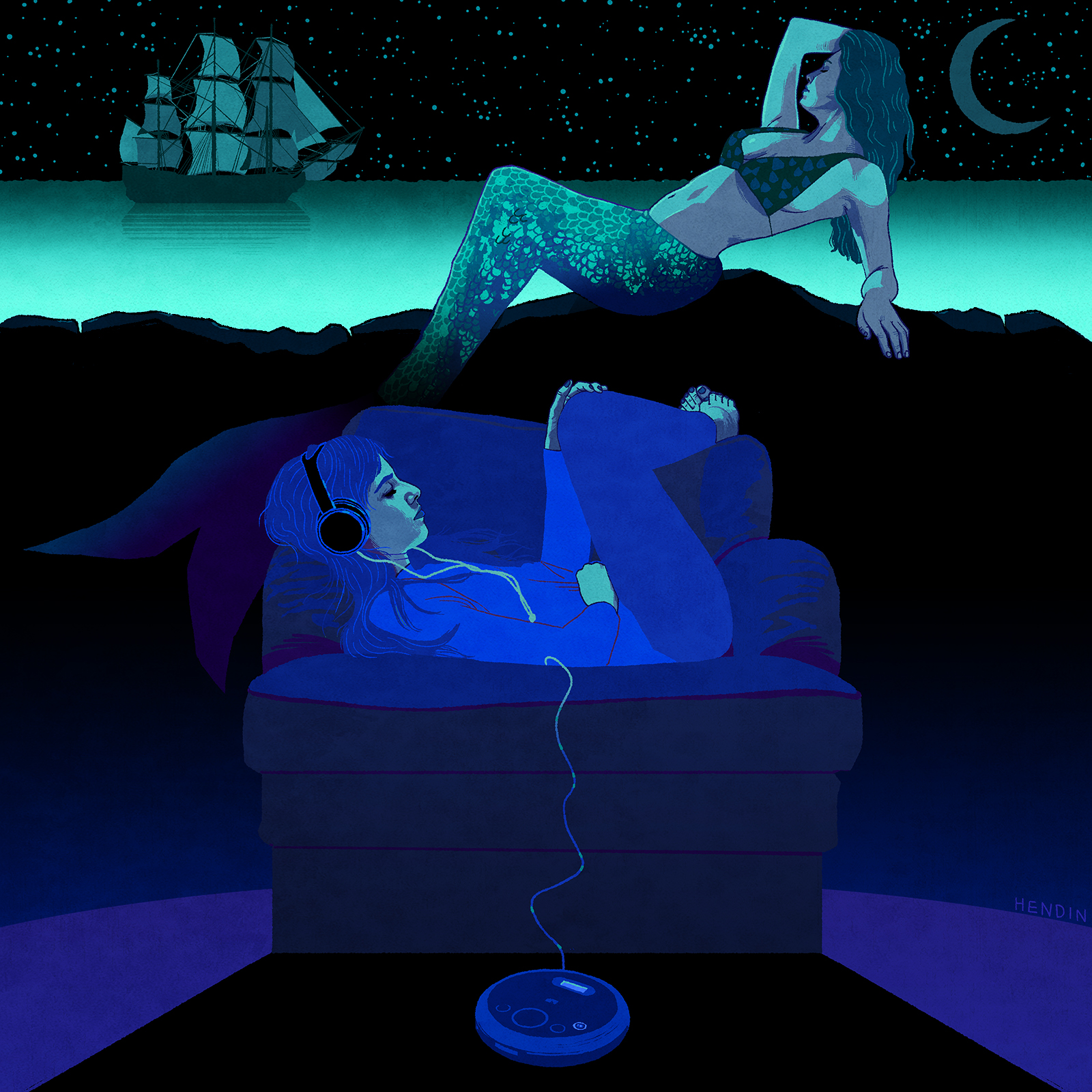Guest Album Review – “Blade Runner Soundtrack” by Vangelis
This guest review was originally part of a music blog project I created called Under The Deer. Since that site won’t be around forever, I’m archiving these wonderful reviews and their accompanying illustrations here. Writer and illustrator listed at end of the review.
There is one album I’ve listened to more times than any other, and I discovered it in a way that is likely opposite from most listeners. As a child, my mother owned the soundtrack of a commercially unsuccessful science fiction movie that had come out before I was born. I would put it in an old, portable CD player and try to imagine what the movie looked like.
It began with an ominous, ethereal note and then, there was a voice.
“Enhance thirty-four to forty-six.”
A computer beeped, then there was a whirring noise.
“Pull back. Wait a minute. Go right. Stop. Enhance fifty-seven nineteen. Track forty-five left. Stop. Enhance fifteen to twenty-three. Give me a hard copy, right there.”
Then the music set in, with a glissando of what sounded like a space harpsichord and a fat, synthesized sense of mystery. It would be years until I would see Harrison Ford speak these words, or understand their significance in relation to the film’s narrative. Yet I wore that disc out, playing it over and over again. To this day, every time I watch Blade Runner, those familiar notes give me chills. Director Ridley Scott, who chose Vangelis to compose the score after hearing his Academy Award-winning work in Chariots of Fire, said, “Fundamentally, in a sentence, I’ll say [Vangelis] was the soul of the movie.”
Though Blade Runner is an 80s film, the music sounds timeless to me. I think of Amazon’s Electric Dreams, based, like Blade Runner, on the sci-fi fiction of Philip K. Dick. The episodes lack the acerbic darkness of Black Mirror, possibly because instead of being set in a bleak future the people of 2018 can imagine, they’re set in the future the people of the mid-century imagined. Blade Runner and its score feels the same way to me: someone else’s dystopian future, both beautiful and haunting.
The Blade Runner soundtrack was not released until a dozen years after the movie, in 1994. There had been bootleg versions, but this official release was the one I had. It wasn’t in chronological order. Some of the songs from the film were missing, and some tracks not featured in the film were included. “Rachael’s Song,” my favorite piece and one commonly associated with Blade Runner, was never used in the film. Here, Mary Hopkin’s melismatic vocals convey a range of emotion as they swirl over lush synth. As a kid, I would imagine a siren on a gray and rocky islet, beckoning to a passing ship. “Memories of Green” was warmer, its tinkling piano seeming to convey something fragile and important, though the futuristic whirring and beeping, combined with the title, indicated that whatever it was had long disappeared.

Mid-album, there was a song that felt older, as though it was meant to be played on a tinny radio or a parlor Victrola. “One More Kiss, Dear,” it was called, and I soon learned all the words. Scott had initially imagined The Ink Spots’ “If I Didn’t Care” (1939) for the film, yet Vangelis was able to offer an original that sounded as though it were written 40 years earlier. Peter Skellern provided the lyrics, and, interestingly enough, would later form a group called Oasis with Mary Hopkin. Not that Oasis.
“End Titles” is perhaps the only track that felt like the 80s to me, with its insistent synth bass line, made more fervent by bombastic timpani. The final track, “Tears in Rain,” was so majestically sorrowful—a simple and slow melody fading, like Roy Beatty, into obscurity.
Some of the songs were, dare I say, better without the film. The noir “Love Theme,” featuring a bawdy saxophone solo by Dick Morrissey, could be construed as romantic on its own. At the very least, it was one of the only tracks I listened to that didn’t conjure a sense of vast isolation. Yet in the film itself, Deckard aggressively coerces Rachael into a physical relationship; the scene was better in my head.
I know now that Vangelis’ score and the film are both iconic, important pieces in their respective worlds. I know that falling in love with this album was a portent for my teenage music tastes; specifically, the brooding computer music of Nine Inch Nails and Trent Reznor’s associated contemporaries. (Who am I kidding? I listen to Pretty Hate Machine and The Downward Spiral just as much as an adult.)
Yet as a kid, with no guiding narrative but the pulp album cover, these songs were an endless trove of imagination and wonder. Mostly wordless, void of lyrics save “One More Kiss, Dear” and the snippets of dialogue, I was free to build my own cinematic stories—even if I was just sitting in a rocking chair in a Midwestern home. I live in Los Angeles now, Blade Runner’s setting, little more than a year away from its starting date of November 2019. It doesn’t look anything like Blade Runner out here, but on those rare rainy days, I still put on this album and pretend.*
*Technically, I put on the 2002 Esper Edition, because we might not be anywhere near having hover cars in 2018, but we can stream it on YouTube.
Contributors

Juliet Bennett Rylah is a Los Angeles-based freelance writer with bylines including LA Weekly, Atlas Obscura, Nerdist, LAist, Time Out LA, and Thrillist. She’s a Halloween and cat enthusiast who loves a good monster-of-the-week TV show.

Rebecca Hendin is a multi-award winning freelance illustrator based in London. She worked as an in-house illustrator at BuzzFeed from 2015 through 2018 and is a nationally syndicated political cartoonist in the US. Freelance clients include BBC, Amnesty International, Google, Gimlet Media, New Statesman, The Nib, Politico, Island Records, Giphy, VICE, Donmar Warehouse, and more.